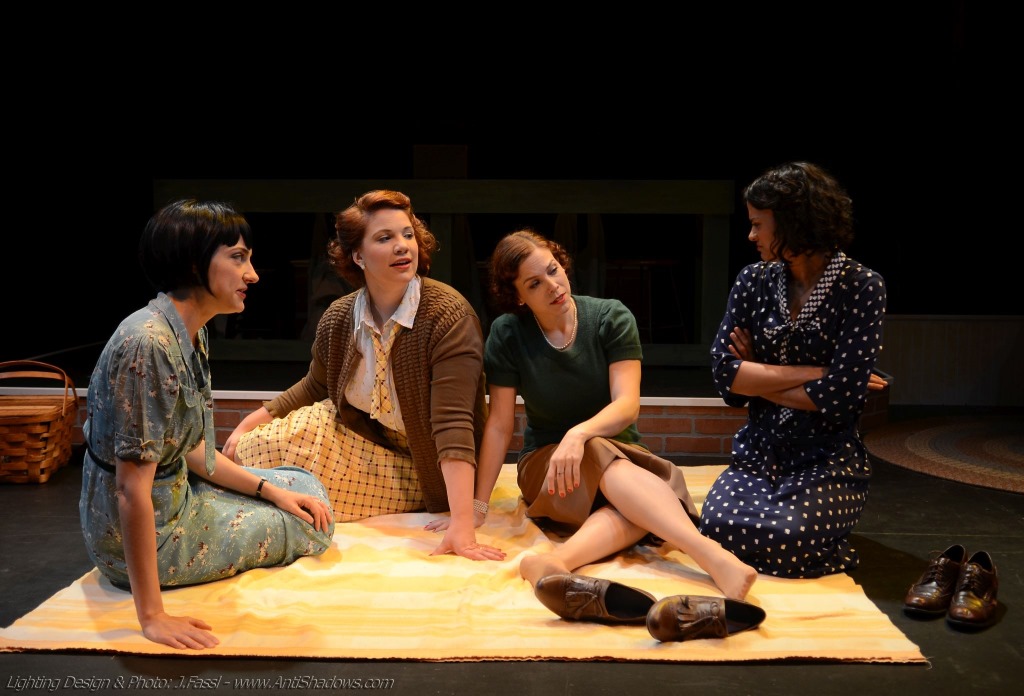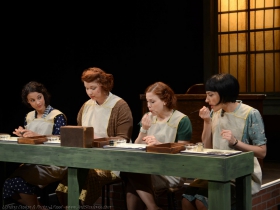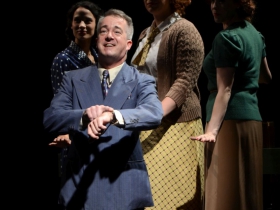Lives of the Radium Girls
Umbrella Group’s staging of true story about 1920s women working at the Radium Dial Company becomes a harrowing, human tragedy.

These Shining Lives: Libby Amato, Linnea Koeppel, Anna Figlesthaler, Jade Taylor. Photo by Jason Fassl.
Underneath the attention received by better known companies and more practiced actors there are emerging talents in Milwaukee theater. As they develop their chops they’re often attracted to meaningful, socially- conscious stories that more patrons should be thinking about even if the play’s form is difficult for even more experienced performers to handle.
Such is These Shining Lives, from an award-winning writer still looking for the perfect vehicle for her talents, Melanie Marnich, who has created some of the repartee and relationships I liked the most in such TV series as “Big Love” and “The Big C.” It is her sense of repartee and uplifting message in the face of death that creates the best moments in the Umbrella Group Theatre’s full blown staging through July 19 in the Next Act Theatre’s attractive performance space at 255 S. Water St.
The purpose was to dig out the personal meanings even more than the social tragedy of the Radium Girls of the 1920s. This true story was an early 20th century indictment of big business at a time when the jobs and technology concocted by a popular watch company overcame any public concern or official scrutiny about its impact on the health of workers. Illinois’ Radium Dial Company offered high-paying wages unheard of at the time to young women for putting brushes in their mouths and then dipping them into radium powder to paint thousands of glowing numbers for clocks and wristwatches — with no warning about the poisoning and terminal illness caused and only aspirin offered for their incandescent skin and aching, deteriorating teeth and joints.
The lure of money — $8 a day, more than many men made back then – and the chance for eager young women to combine home and paycheck came along just as they were gaining the right to vote, to smoke, to feel independence with some pocket change. But companies of the time also expected them to fade and wither as their bodies were doing. Except they fought back as they were dying, winning court victories and changing labor laws in the process. (In 1917 there had been a similar Radium Girls case in New Jersey so there could be no claim of ignorance of the danger in Illinois.) This play mainly tries to suggest who these people were: the “shining lives” forgotten by the media and the citizenry at the time and perhaps in the decades since. (It is so resonant a lesson play that it has also been turned into a new musical in Chicago.)
It would be hard in the best of circumstances – and Wisconsin right now is certainly not the best of circumstances – to ignore the social echoes of this tale today: the scientific charlatanism and legal maneuvers to protect corporate profits by stalling the day of judgment. It is also timeless — and Marnich’s play was written seven years ago about events of the 1920s and 1930s — to explore the humanity and determination to win yet willingness to forgive exhibited by ordinary people in the face of certain death.
But Marnich has not escaped and slightly exploits the maudlin moments. She even tries to create one-line epigrams about how common folks respond to tragedy, none of which really work. But the play’s best moments involve the daily repartee, the sense and psychology of comradeship and the moments when the women’s giddy, materialistic delight in being useful to family and business turns into growing horror at being duped and doomed.
The young director here is Mallory Metoxen, who seems infused with passion for the material and is theatrically savvy enough to lean on the power of tableaus and traded dialog, but can’t solve the built-in problems of a script that never quite trusts itself to land one punch when it can dance around the ring with flurries. Audiences will get the point without so much rope a dope.
As Catherine’s co-workers who eventually follow her lead to fight the watch company, Linnea Koeppel and Jade Taylor provide some pleasant moments that survive some rather forced camaraderie. But there is a more profound understanding of how sarcasm can share space with tense stillness from Anna Figlesthaler, whose Charlotte struck me as the subtlest and truest character performance of the group. Still, the actors in general require even more understanding and theatrical tools of which lines should be thrown over the shoulder and what feelings should creep over us rather than smack us in the face. Solid interpretive work is also provided in multiple roles by Randall T. Anderson and Tom Marks.
Marnich, in her attempts to compress events, muse on relationships and signal outcomes, doesn’t always make it easy for Metoxen, but the director can’t or wouldn’t rewrite the play or trim it, it seems. But she had the sense of how to just go right after it, playing the meaning and meanderings to the hilt. That makes for an engaging 90 minutes – and maybe a sign of even more enduring things to come for both playwright and director.
Dominique Paul Noth served for decades as film and drama critic, later senior editor for features at the Milwaukee Journal. You can find his blog here and here.
These Shining Lives Gallery
Review
-
Eating Burmese in Bay View
 Dec 13th, 2025 by Cari Taylor-Carlson
Dec 13th, 2025 by Cari Taylor-Carlson
-
Casablanca Is a Milwaukee Success
 Nov 30th, 2025 by Cari Taylor-Carlson
Nov 30th, 2025 by Cari Taylor-Carlson
-
Oh, Those Witty 18th Century Brits
 Nov 24th, 2025 by Dominique Paul Noth
Nov 24th, 2025 by Dominique Paul Noth
Theater
-
Oh, Those Witty 18th Century Brits
 Nov 24th, 2025 by Dominique Paul Noth
Nov 24th, 2025 by Dominique Paul Noth
-
Skylight’s Holiday Show Is Lots of Fun
 Nov 16th, 2025 by Dominique Paul Noth
Nov 16th, 2025 by Dominique Paul Noth
-
Rep’s ‘Come From Away’ Is a Triumph
 Nov 10th, 2025 by Dominique Paul Noth
Nov 10th, 2025 by Dominique Paul Noth























